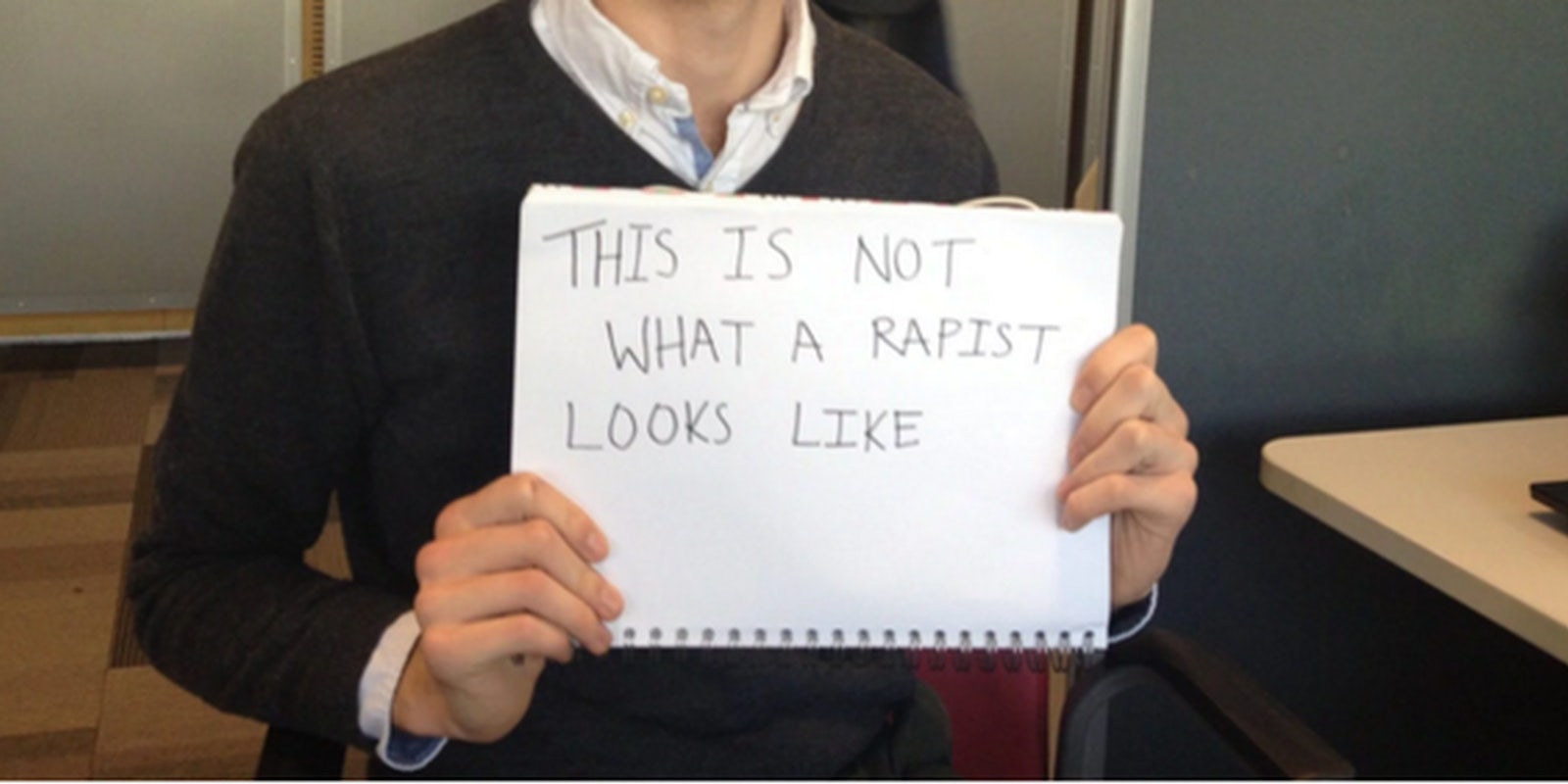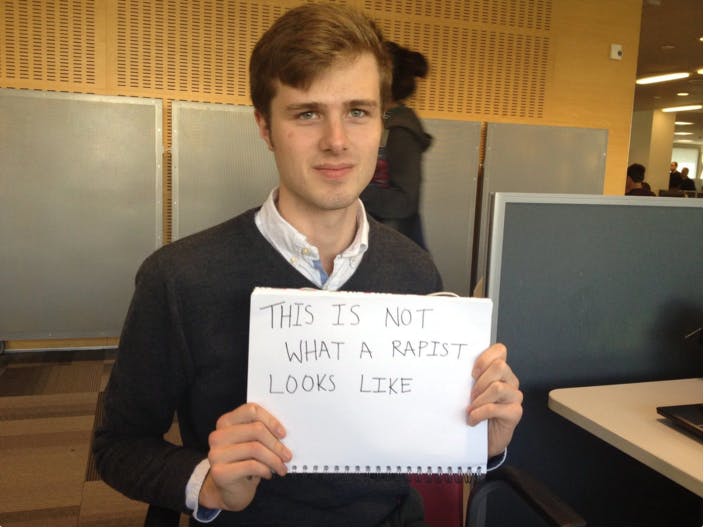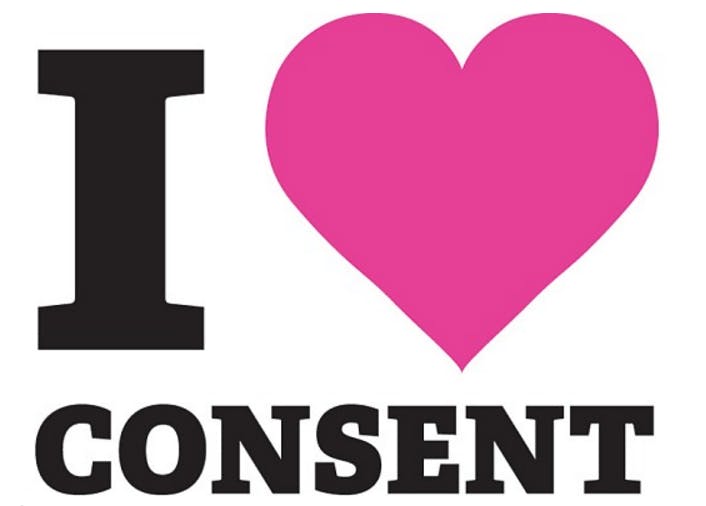Universities and high schools around the world are adding lessons about obtaining consent for sex to workshops and classes. Earlier this week, however, Warwick University student George Lawlor provocatively claimed in an online article that teaching students about consent is offensive—to the students.
Lawlor published a piece on the Tab, a blogging platform for U.K. college students, titled ‘Why I don’t need consent lessons.’ The Oct. 14 op-ed piece was in response to an invite to a campus workshop on sexual consent, called I Heart Consent Campaign Warwick. Calling the workshop a “waste of time” and a “smug, righteous, self-congratulatory intervention,” Lawlor wrote that the invitation was “the biggest insult I’ve received in a good few years.”
To illustrate the piece, Lawlor included a picture of himself holding up a placard that emphatically states, “THIS IS NOT WHAT A RAPIST LOOKS LIKE.”
Lawlor’s article and the accompanying photo spurred a swift response. Writers have taken to the U.K.’s Telegraph (‘Breaking news: Rapists can be nice university-educated boys’) as well as the Warwick student newspaper, the Boar. “These consent workshops are not a personal attack on anyone’s character,” wrote student Halimah Manan in the Boar. “They are a collective response to a real threat and real statistics. Anyone who takes it as a personal affront is entirely missing the point.”
Consent is an increasingly popular topic in sexual education. In fact, this month, California became the first state to mandate consent is taught in high school health classes. Enthusiastic consent or affirmative consent, AKA “yes means yes,” are seen by activists and sexual health educators as more empowering and clear than the traditional “no means no” paradigm. Obtaining enthusiastic consent is meant prevent sexual abuse of victims who are silent, asleep or incapacitated by drugs or alcohol.
Critics of enthusiastic consent education often point out communication on sexual and romantic matters can fall into a gray area. Activists counter that these gray areas are exactly why communication needs to be more clear.
Josie Throup, Warwick’s woman’s officer and one of the organizers of the I Heart Consent workshop, wrote her own piece on the Tab, emphasizing that students should not consider themselves exempt from consent education. Throup wrote:
The truth is, I’m not sorry my workshop made this writer [Lawlor] feel uncomfortable. The first time I was confronted with the statistic that 80 per cent of rape survivors know their attacker, I felt the same. When I thought about this and realised most rapists are normal members of society, I felt sick. I still do feel sick when I think about the cycles of abuse perpetrated by partners, parents, and friends of people I know. Self-styled ‘decent, empathetic human beings,’ like this writer.
When contacted by the Daily Dot, Throup deferred to her response on The Tab as her statement on the matter.
In an email to the Daily Dot, Lawlor did not dispute the veracity of statistics about sexual violence (“They fill me with anger”) but objected to receiving an invitation from his university to address it. He wrote:
“I do not think that consent workshops at the start of the year are the way to go about tackling the problem. You can’t just point at a chalkboard and say ‘this is consent, this is not consent, now go out and be a fresher’ [freshman]. That won’t work. It has to be long term and what Josie Throup suggests is too little too late, in my opinion. … [Respect] has to be engrained and fundamental to how one treats others and that cannot be taught almost as an after thought as it is now.”
Warwick University’s press office did not respond to a request for comment.
Some criticisms of Lawlor’s sign have said his statement could be viewed as classist or racist, seeing as he is a clean-cut, young, white university student. According to a report by the UK’s National Union of Students (NUS) on students’ experience of sexual assault and sexual harassment, other students were the majority of perpetrators. Additionally the study found that the majority of perpetrators of sexual assault were already known to the victim.
Still, Lawyer claims his “picture has been misunderstood.” He wrote to the Daily Dot:
Of course a rapist could look like me in a superficial sense. Anyone could be a rapist, it doesn’t matter what their demographic is. What I meant was that I, as an individual, not as a man, not as a white person etc. etc. do not look like a rapist because I am not a rapist. It’s that simple. It’s not classist and it’s not racist, and I feel people who do indeed try to bring those elements to the argument are not helping the discussion at all.
The workshops, part of the I Heart Consent campaign organized by NUS, are open to students of all gender identities. They include sections on defining what consent is and what it is not, myth-busting about sexual assault, and discussions on how victim-blaming and slut-shaming create a culture that deters rape victims from coming forward.
Lawlor, for his part, feels vindicated for speaking up on an opinion he says other students share. “I put my head above the parapet and people have congratulated me for that and have thanked me for saying things they feel but are have been too afraid to say,” he wrote to the Daily Dot.
He added, “I am so happy that people are talking about this. It’s all I wanted and it’s right that those who are often unheard are now being heard.”
Photo via George Lawlor/The Tab




